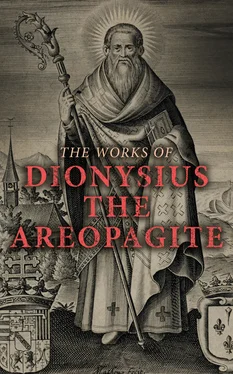Moreover, all things whatever, which are and come to being, are and come to being by reason of the Beautiful and Good; and to It all things look, and by It are moved and held together, and for the sake of It, and by reason of It, and in It, is every source exemplary, final, creative, formative, elemental, and in one word, every beginning, every bond, every term, or to speak summarily, all things existing are from the Beautiful and Good; and all things non-existing are superessentially in the Beautiful and Good; and it is of all, beginning and term, above beginning and above term, because from It, and through It, and in It, and to It, are all things, as says the Sacred Word.
By all things, then, the Beautiful and Good is desired and beloved and cherished; and, by reason of It, and for the sake of It, the less love the greater suppliantly; and those of the same rank, their fellows brotherly; and the greater, the less considerately; and these severally love the things of themselves continuously; and all things by aspiring to the Beautiful and Good, do and wish all things whatever they do and wish. Further, it may be boldly said with truth, that even the very Author of all things, by reason of overflowing Goodness, loves all, makes all, perfects all, sustains all, attracts all; and even the Divine Love is Good of Good, by reason of the Good. For Love itself, the benefactor of things that be, pre-existing overflowingly in the Good, did not permit itself to remain unproductive in itself, but moved itself to creation 36, as befits the overflow which is generative of all.
SECTION XI.
And let no one fancy that we honour the Name of Love beyond the Oracles, for it is, in my opinion, irrational and stupid not to cling to the force of the meaning, but to the mere words; and this is not the characteristic of those who have wished to comprehend things Divine, but of those who receive empty sounds and keep the same just at the ears from passing through from outside, and are not willing to know what such a word signifies, and in what way one ought to distinctly represent it, through other words of the same force and more explanatory, but who specially affect sounds and signs without meaning, and syllables, and words unknown, which do not pass through to the mental part of their soul, but buzz without, around their lips and ears, as though it were not permitted to signify the number four, by twice two, or straight lines by direct lines, or motherland by fatherland, or any other, which signify the self-same thing, by many parts of speech.
We ought to know, according to the correct account, that we use sounds, and syllables, and phrases, and descriptions, and words, on account of the sensible perceptions; since when our soul is moved by the intellectual energies to the things contemplated, the sensible perceptions by aid of sensible objects are superfluous; just as also the intellectual powers, when the soul, having become godlike, throws itself, through a union beyond knowledge, against the rays of the unapproachable light, by sightless efforts. But, when the mind strives to be moved upwards, through objects of sense, to contemplative conceptions, the clearer interpretations are altogether preferable to the sensible perceptions, and the more definite descriptions are things more distinct than things seen; since when objects near are not made clear to the sensible perceptions, neither will these perceptions be well able to present the things perceived to the mind. But that we may not seem, in speaking thus, to be pushing aside the Divine Oracles, let those who libel the Name of Love (Ἔρωτος) hear them. “Be in love with It,” they say, “and It will keep thee—Rejoice over It, and It will exalt thee—Honour It, in order that It may encompass thee,”—and whatever else is sung respecting Love, in the Word of God.
SECTION XII.
And yet it seemed to some of our sacred expounders that the Name of Love is more Divine than that of loving-kindness (ἀγάπης). But even the Divine Ignatius 37writes, “my own Love (ἔρως) is crucified;” and in the introductions to the Oracles you will find a certain One saying of the Divine Wisdom, “1 became enamoured of her Beauty.” So that we, certainly, need not be afraid of this Name of Love, nor let any alarming statement about it terrify us. For the theologians seem to me to treat as equivalent the name of Loving-kindness, and that of Love; and on this ground, to attribute, by preference, the veritable Love, to things Divine, because of the misplaced prejudice of such men as these. For, since the veritable Love is sung of in a sense befitting God, not by us only, but also by the Oracles themselves, the multitude, not having comprehended the Oneness of the Divine Name of Love, fell away, as might be expected of them, to the divided and corporeal and sundered, seeing it is not a real love, but a shadow, or rather a falling from the veritable Love. For the Oneness of the Divine and one Love is incomprehensible to the multitude, wherefore also, as seeming a very hard name to the multitude, it is assigned to the Divine Wisdom, for the purpose of leading back and restoring them to the knowledge of the veritable Love; and for their liberation from the difficulty respecting it. And again, as regards ourselves, where it happened often that men of an earthly character imagined something out of place, (there is used) what appears more euphonius. A certain one says, “Thy affection fell upon me, as the affection of the women.” For those who have rightly listened to things Divine, the name of Loving-kindness and of Love is placed by the holy theologians in the same category throughout the Divine revelations, and this is of a power unifying, and binding together, and mingling pre-eminently in the Beautiful and Good; pre-existing by reason of the beautiful and good, and imparted from the beautiful and good, by reason of the Beautiful and Good; and sustaining things of the same rank, within their mutual coherence, but moving the first to forethought for the inferior, and attaching the inferior to the superior by respect.
SECTION XIII.
But Divine Love is extatic, not permitting (any) to be lovers of themselves, but of those beloved. They shew this too, the superior by becoming mindful of the inferior; and the equals by their mutual coherence; and the inferior, by a more divine respect towards things superior. Wherefore also, Paul the Great, when possessed by the Divine Love, and participating in its extatic power, says with inspired lips, “I live no longer, but Christ lives in me.” As a true lover, and beside himself, as he says, to Almighty God, and not living the life of himself, but the life of the Beloved, as a life excessively esteemed. One might make bold to say even this, on behalf of truth, that the very Author of all things, by the beautiful and good love of everything, through an overflow of His loving goodness, becomes out of Himself, by His providences for all existing things, and is, as it were, cozened by goodness and affection and love, and is led down from the Eminence above all, and surpassing all, to being in all, as befits an extatic superessential power centred in Himself. Wherefore, those skilled in Divine things call Him even Jealous, as (being) that vast good Love towards all beings, and as rousing His loving inclination to jealousy,—and as proclaiming Himself Jealous—to Whom the things desired are objects of jealousy, and as though the objects of His providential care were objects of jealousy for Him. And, in short, the lovable is of the Beautiful and Good, and Love preexisted both in the Beautiful and Good, and on account of the Beautiful and Good, is and takes Being.
SECTION XIV.
But what do the theologians mean when at one time they call Him Love, and Loving-kindness, and at another, Loved and Esteemed? For, of the one, He is Author and, as it were, Producer and Father; but the other, He Himself is; and by one He is moved, but by the other He moves; or (when they say), that He Himself is Procurer and Mover of Himself and by Himself. In this sense, they call Him esteemed and loved, as Beautiful and Good: but again Love and Loving-kindness, as being at once moving and conducting Power to Himself;—the alone—self Beautiful and Good, by reason of Itself, and, being, as it were, a manifestation of Itself through Itself, and a good Progression of the surpassing union, and a loving Movement, simplex, self-moved, self-operating, pre-existing in the Good, and from the Good bubbling forth to things existing, and again returning to the Good, in which also the Divine Love indicates distinctly Its own unending and unbeginning, as it were a sort of everlasting circle whirling round in unerring combination, by reason of the Good, from the Good, and in the Good, and to the Good, and ever advancing and remaining and returning in the same and throughout the same. And these things our illustrious initiator divinely set forth throughout His Hymns of Love, of which we may appropriately make mention, and, as it were, place as a certain sacred chapter to our treatise concerning Love.
Читать дальше












